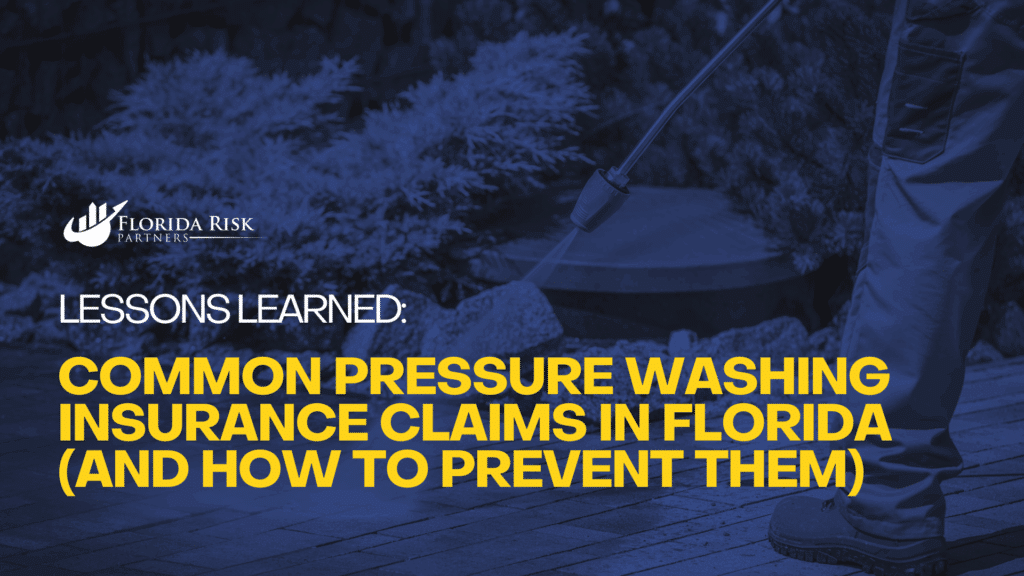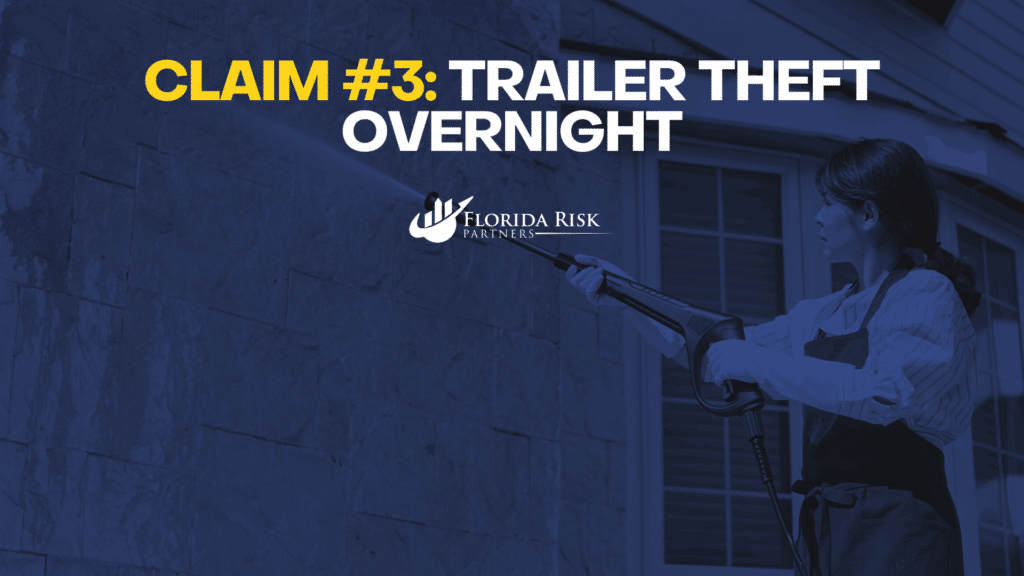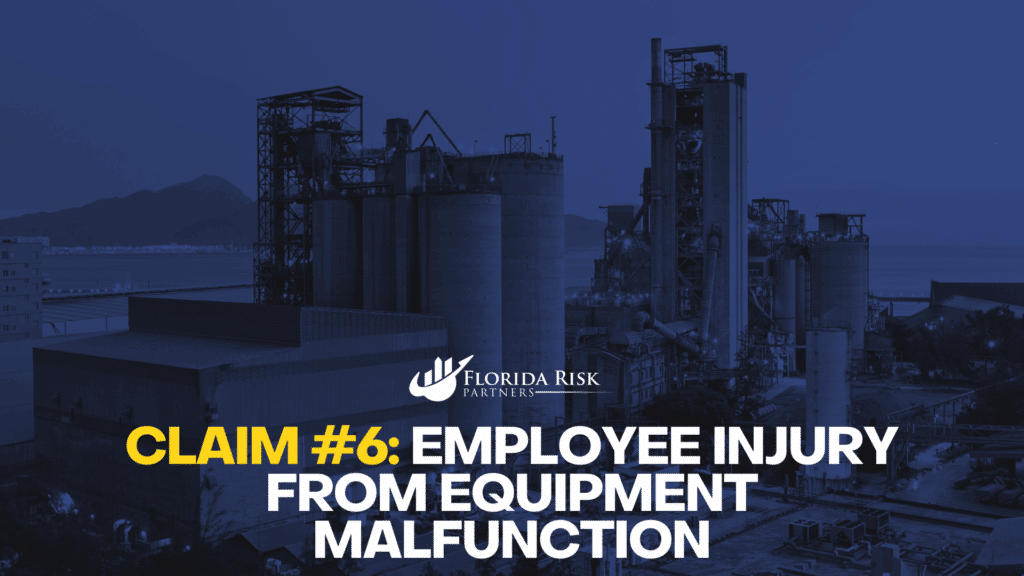-
Main Office: 1434 E. Bloomingdale Ave Valrico, FL 33596-6110
-
Phone: (888) 601-6660
-
Email: info@floridariskpartners.com

Running a pressure washing business in Florida offers a world of opportunity—but it also comes with real risks. From high-powered equipment mishaps to chemical overspray and costly property damage, even the most experienced contractors can find themselves on the wrong side of a claim.
If you think a single incident can’t hurt your business, think again.
Over the years, we’ve helped countless pressure washing contractors across the Sunshine State navigate difficult claims—some minor, some devastating. The good news? Almost all of them were preventable. And even the ones that weren’t were made manageable with the right insurance coverage in place.
In this post, we’ll explore some of the most common insurance claims pressure washers face in Florida, how they play out, which coverages responded, and—most importantly—how you can avoid them.
Claim #1: Overspray Damages a Neighbor’s Car
What Happened:
A residential pressure washing contractor was soft washing a client’s roof in Clearwater. They failed to notice a car parked in the neighbor’s driveway. Wind carried chemical overspray (sodium hypochlorite) onto the vehicle, damaging the paint and rubber seals.
Outcome:
- Claim filed for $6,800 in damages
- Paid under the contractor’s general liability policy
- Neighbor threatened legal action, but the claim was settled without court
How to Prevent It:
- Use tarps or plastic sheeting to protect nearby property
- Always check surrounding areas before spraying
- Inform neighbors if working near property lines
- Invest in low-pressure nozzles and directional flow control
- Have a clear SOP (standard operating procedure) for chemical handling
Claim #2: Slip-and-Fall on a Wet Sidewalk
What Happened:
While pressure washing a strip mall in Orlando, a contractor failed to rope off the walkway. A pedestrian walking into a business slipped on wet concrete and fractured their wrist.
Outcome:
- Medical expenses and lost wages: $45,000
- Paid by the contractor’s general liability insurance
- The property manager required additional insured status, which protected them too
How to Prevent It:
- Always use cones, caution tape, and signage to mark wet zones
- Dry walkways with blowers if possible before reopening to the public
- Clean during low-traffic hours to minimize exposure
- Confirm contractual requirements with clients before starting work
Claim #3: Trailer Theft Overnight

What Happened:
A pressure washing contractor parked their work trailer at a hotel in Fort Myers during a two-day commercial job. Overnight, the trailer and all its contents—including a hot water skid, water tanks, hoses, and surface cleaner—were stolen.
Outcome:
- Total loss estimated at $28,000
- Equipment was covered under inland marine insurance
- Trailer itself covered under the commercial auto policy
- Business lost two weeks of income waiting on replacements
How to Prevent It:
- Install hitch locks, wheel locks, and GPS trackers
- Park in well-lit, secure locations whenever possible
- Consider insurance riders for trailers and contents
- Store high-value gear indoors when not in use
Claim #4: Water Intrusion During Roof Cleaning
What Happened:
A technician accidentally used too much pressure during a roof wash in Sarasota. Water entered through a damaged vent and soaked the attic insulation and ceiling of the home below.
Outcome:
- Property damage claim totaled $11,200
- Paid under general liability, but a roof cleaning endorsement was required
- The contractor initially had a policy that excluded roof work—claim was almost denied
How to Prevent It:
- Inspect all roof areas before starting
- Use soft wash techniques and low-pressure systems
- Ask clients about known leaks or vent issues
- Confirm that your insurance policy explicitly covers roof cleaning
Claim #5: Chemical Runoff Violates Local Environmental Code
What Happened:
During a restaurant pad cleaning in Miami, grease, detergent, and debris were washed into a storm drain. The city received a complaint, investigated, and issued a code violation for illegal discharge.
Outcome:
- Fine from city: $10,000
- Remediation costs: $3,000
- Covered under the contractor’s pollution liability policy
- Contractor required to attend environmental compliance training
How to Prevent It:
- Use berms or sandbags to redirect water
- Invest in a reclaim system or vacuum recovery unit
- Block storm drains during chemical use
- Follow local NPDES and city ordinances
- Carry pollution liability insurance—general liability will not cover runoff fines
Claim #6: Employee Injury from Equipment Malfunction

What Happened:
An employee in Palm Beach County was operating a surface cleaner when a hose fitting burst. Pressurized water struck their leg, causing a deep laceration and requiring surgery.
Outcome:
- Medical expenses and lost wages totaled $34,000
- Covered by workers’ compensation insurance
- Employee returned to work after six weeks
How to Prevent It:
- Perform regular maintenance checks on all hoses, fittings, and machines
- Train employees on safe startup and shutdown procedures
- Use PPE (personal protective equipment), including steel-toed boots and pants
- Confirm that you carry workers’ comp coverage if you have 4+ employees (required by Florida law)
Claim #7: Subcontractor’s Mistake Leads to a Lawsuit
What Happened:
A pressure washing company in Naples subcontracted a one-time residential job to a solo operator. The subcontractor cracked tile around a pool deck, and the homeowner sued both parties.
Outcome:
- General liability denied coverage because subcontractor wasn’t listed or insured
- Out-of-pocket settlement: $9,500
- Contractor had no signed agreement with the subcontractor
How to Prevent It:
- Require COIs from all subcontractors
- Only work with insured, licensed professionals
- Use written subcontractor agreements outlining roles, responsibilities, and coverage
- Ask your insurance agent to help structure coverage for occasional subs
What These Claims Teach Us
Across all these real-world scenarios, one truth stands out:
Having the right insurance won’t stop the accident—but it will stop the accident from destroying your business.
Florida’s unique weather, laws, and job environments make pressure washing riskier than many realize. From hurricanes and heat to local regulations and client demands, the pressure’s on—literally and financially.
The Most Common Claims Pressure Washing Contractors Face
Let’s recap the most frequent types of claims:
| Type of Claim | Coverage That Responds |
| Property damage (client) | General Liability |
| Slip-and-fall injuries | General Liability |
| Equipment theft | Inland Marine / Auto |
| Chemical runoff fines | Pollution Liability |
| Roof leaks / water intrusion | GL (with Roof Work Endorsement) |
| Auto accidents | Commercial Auto |
| Employee injuries | Workers’ Compensation |
| Large lawsuits | Umbrella Liability |
Final Thoughts: Don’t Learn the Hard Way
Each claim we covered in this post happened to a real Florida pressure washing business. Some were prepared and bounced back quickly. Others were caught off guard and paid the price—financially, emotionally, and reputationally.
Use their stories as your playbook. Take time to:
- Review your coverage
- Update your policies based on your current work
- Train your team on risk prevention
- Work with an agent who understands pressure washing
Because when it comes to running a business, it’s not just about avoiding mistakes—it’s about being ready when they happen.
We specialize in helping Florida pressure washing contractors identify and close coverage gaps before they turn into costly claims. Let’s make sure your policy is built for the risks you face every day.
Call Us Or
Schedule an Appointment
Select an agent below to view our online calendars and select a day and time that works best for you or call us directly at 888-601-6660. When you use our online calendars, you will receive an email with more information.



